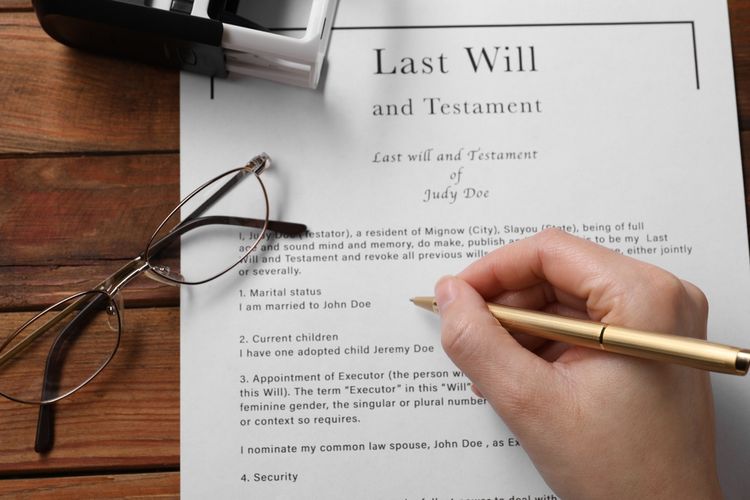The loss of a loved one is a painful and overwhelming ordeal. It’s easy to get confused and unsure of what to do next. In our experience, the probate process tends to be a stressful and challenging process for families to undertake while still enduring the pain of losing a loved one. It’s easy for the process to take longer than you’d want and cost you a lot if you do not have the right legal assistance.
With that in mind, 615-NASH-LAW primary goal is to help you honor and protect your loved one’s wishes by providing clarity and guidance through the often confusing probate process. We appreciate that undertaking the probate process is the last thing you’d want, but in many cases, it is necessary and critical for your family’s well-being. As such, we aim to help settle your loved one’s estate fairly and as quickly as possible and set you on a path to long-term healing.
Contact us today at 615-NASH-LAW for an experienced Nashville probate lawyer.
Table of Contents
What is Probate?
The term probate has evolved to refer to several matters. Traditionally, probate meant presenting and proving a will in court in a process known as “probating a will.” However, the term also refers to the court that handles administration proceedings.
Today, however, the term is more often used to refer to the chancery court-supervised process of a surviving loved one (spouse, child, or close family member) being given the legal authority to gather the assets of the decedent, satisfying their outstanding debts and taxes, and distributing the remaining assets to the inheritors. It is a necessary legal process determining the assets owned solely by the decedent – the “probate estate” or “probate assets.” It also determines what happens to these assets.
The process typically takes between six months to a year. However, it can take longer if there are legal fights over the will and the unusual assets or debts to settle.
What Type of Assets Go Through Probate Court?
In Nashville, all assets that form part of the probate estate go through a court-supervised process. This includes properties and accounts. However, properties can bypass the probate process due to how they are titled or beneficiary designations.
Some of the assets that do not form part of the probate estate/assets, even if the decedent owned them, include:
- Life Insurance and Retirement Accounts: If the decedent named a beneficiary of a retirement account, 401K, life insurance policies, or annuities, the proceeds do not form part of the probate estate and do not go through the probate process.
- Transfer-on-Death Securities (TOD): If the deceased named transfer-on-death beneficiaries for securities, they are not part of the probate estate and are passed directly to the beneficiary.
- Payable-on-Death Bank Accounts (POD): Payable-on-death bank accounts pass directly to the beneficiary without going through probate.
- Joint Tenancy Property: Assets held in joint tenancy (including bank accounts, houses, land, etc.) by more than one person do not need to form part of the probate estate. When one person passes on, the remaining individual becomes the property owner.
- Tenancy by the Entirety Property: In cases where the decedent owned real estate with their spouse in tenancy by entirety, the spouse automatically becomes the sole owner of the property.
- Living Trust Assets: Assets the deceased held for a trustee of a living trust do not form part of the probate estate.
What is the Probate Process?
Initial Steps in Probate
When someone dies, no one can access the deceased’s assets that were titled under his or her name, even their spouse and children. To access the assets, they must undertake the probate process.
The initial steps involve the person named as the executor (or personal representative) in the will depositing the original will in the probate office of the county clerk where the deceased lived. After that, the executor is given the “letters testamentary,” bestowing them the authority to take charge of the estate assets.
However, in cases where the deceased did not leave a signed will, the court issues “letters of administration” to a surviving spouse or grown child after they ask to be administrators of the estate.
Role of the Executor/Administrator
After the executor is handed letters of testamentary or the court grants the spouse or a grown child letters of administration, he or she has responsibility over the probate assets. They are responsible for gathering the deceased probate assets. Additionally, they are required to notify everyone who stands to inherit as per the will or law.
The personal representative should also file a Request for Release with TennCare as proof the estate does not owe state Medical agency reimbursements for home care or nursing care received.
The administrator is also responsible for obtaining a taxpayer identification number from the IRS to open an estate checking account. They typically open a checking account for the estate and transfer the deceased account to it. These funds will be used to pay for the expenses associated with the estate.
The estate administrator is also responsible for notifying the deceased’s creditors to enable them to make a claim on the estate. To this end, they identify the creditors through the deceased finances. Thereafter, they are responsible for paying the deceased debts and taxes and distributing whatever remains to the individuals who stand to inherit.
The administrator may also be required to perform probate proceedings in other states where a deceased owned property in a different state.
Probate Court Proceedings
The probate court proceedings begin with submitting a will or request for administration letters. In cases where a will exists, the court process begins by proving its validity. If the will was signed in the presence of two witnesses, one of them must submit a sworn statement to its validity or visit the court to verify its validity. However, the two witnesses must submit sworn statements or go to court if the will is contested.
If the will was not signed in the presence of any witnesses and it is handwritten by the deceased, two witnesses must testify that the handwriting is authentic and, indeed, is the deceased handwriting.
After that, the court appoints an administrator, who must, within 60 days:
- Notify the heirs of the estate,
- Submit an inventory of the probate assets and
- File a Request for Release with TennCare.
While the administrator notifies all creditors, the court clerk also publishes a death notice in local newspapers. Doing this gives creditors a chance to make claims, which are typically settled between four months and a year after receiving notice of probate proceedings.
What Are the Different Types of Probate?
Formal vs. Informal Probate
As the name suggests, formal probate is a probate proceeding that strictly follows all protocols the law outlines. The probate court oversees the process to ensure every step is completed correctly.
Formal probate proceedings are best to follow in cases where there are disputes about inheritance, out-of-state assets, and multiple assets, such as stocks and bonds, as it provides additional protections.
On the other hand, informal probate proceedings are performed without court supervision. Instead, it uses affidavits to evidence the rights of those involved and the processes involved. It’s generally simpler, but the administrator must abide by the law and legal requirements. To ensure informal probate proceedings are done correctly, it’s best for the administrator to work with an experienced probate attorney.
Informal probate proceedings are best used when dealing with physical assets such as real estate and jewelry. Additionally, all parties involved, including creditors, must agree to an informal probate process.
Summary Administration and Small Estates
Small estate administration offers inheritors a simplified and quicker probate process in cases involving assets totaling no more than $50,000 and no petition to probate the will. While the court is still involved, it does not exert great control over estate settlement matters. You can initiate small estate proceedings 45 days after the death of the decedent by filing an affidavit that covers the following:
- Whether the deceased left a will,
- A complete list of unpaid debts,
- Itemized list and description of the property,
- Any insurance the estate stands to receive and
- List of inheritors.
You may be required to pay a bond before being issued a certified copy. After that, the affiant is responsible for the property’s care, management, and distribution, including paying debts.
What Are Some Common Challenges in Probate?
Contested Wills and Disputes
The legal timeframe for challenging a will requires that any challenge be submitted within two years of the will being submitted to probate. That said, a contest may arise due to several issues. For instance, the validity of a will may be challenged on the basis of competency, where it is claimed the decadence was not of sufficiently sound mind when he or she executed the will. Its validity may be challenged on the basis of undue influence. In most cases, the party contesting the will is entitled to a jury trial.
If you’re facing a will contest, our probate lawyers at 615-NASH-LAW are ready to help and guide you through the process.
Dealing with Debt and Creditors
The estate personal representative is charged with identifying all valid estate creditors. Typically, this involves using the deceased financial records, such as checkbooks and tax returns, to determine the valid creditor for subsequent motivation. Other creditors may come forth upon learning of probate proceedings. Usually, creditors submit their claims informally, and the administrator pays them.
When there is insufficient money to pay all the debts, the estate is considered insolvent. In such a situation, creditors can still file a claim against the estate, even if they stand to receive a partial payment. If you face such a situation, you need an experienced probate lawyer to guide you through the process by explaining the possible payouts and your options.
How Can I Avoid Going to Probate Court?
Estate Planning Tools to Bypass Probate
Your estate does not have to go through probate proceedings for your inheritors to take control of the assets you leave for them. With estate planning, you can bypass the long and often confusing probate process. Some of the tools you can use to avoid probate include:
- Joint ownership,
- Beneficiary designations,
- Trusts, and
- Payable-on-death accounts.
A combination of these tools can negate the need for probate proceedings, making succession easier and faster for your loved ones.
Benefits of Avoiding Probate
- Time Savings: Probate proceedings rarely take less than six months to administer. Sometimes, it can take more than a year for the family to receive probate assets. This is not ideal for your family as they are forced to divide their attention between probate matters and healing. Additionally, the proceedings can tie up property or assets for years, making it impossible for heirs to benefit from the inheritance on time. Avoiding probate proceedings helps your family save time on issues related to inheritance and focus more on healing.
- Reduced Expenses: Probate proceedings can be costly. The long process also costs a lot of money. Avoiding fees associated with probate proceedings minimizes the cost of your succession, allowing your dependents to benefit more from your estate.
- Privacy Considerations: Avoiding probate proceedings also ensures that the contents and division of your estate remain a private affair, only privy to your family. Probate proceedings occur under the supervision of the courts, the records of which are typically publicly accessible. You can safeguard the privacy of your family by using probate-avoiding tools.
What is the Role of a Probate Attorney?
Navigating the Probate Process
Probate proceedings require the executor to file many documents in the probate court, many of which you need to search for. Additionally, it involves many court proceedings that require an experienced representation. A probate attorney not only provides legal guidance to navigate the complex probate process but is also helpful in providing the necessary representation in court.
Resolving Estate Disputes
Even when a will guides the succession, there is a potential for disputes to arise among the beneficiaries or between beneficiaries and the administrator/executor. Such disputes can delay the probate proceedings for months or years, costing a lot of money and creating friction among family members. An experienced probate attorney will help you solve these issues, ensuring the succession of property is much smoother.
Estate Planning to Avoid Probate
An experienced probate attorney also comes in handy in helping you plan your estate to avoid probate proceedings. By taking this approach, you ensure a smoother transition of your assets.
615-NASH-LAW | Hire an Experienced Probate Lawyer in Nashville
The probate process is long, complex, and time-consuming. You need an experienced hand to guide you through what may seem like a never-ending process. At 615-NASH-LAW, we prioritize helping our clients handle all issues with probate proceedings. We are the go-to firm when you want to avoid probate proceedings and need an experienced team to help you navigate them.
Request a Free Consultation by completing our form here or Contact us at 615-NASH-LAW.




